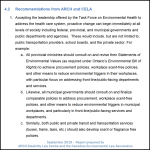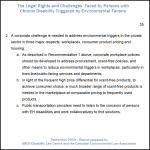“Accepting the leadership offered by the Task Force on Environmental Health to address the health care system, proactive change can begin immediately at all levels of society including federal, provincial, and municipal governments and public departments and agencies.
These would include, but are not limited to, public transportation providers, school boards, and the private sector.”


screenshots
of the report recommendations
with source added
The Legal Rights and Challenges Faced by Persons with Chronic Disability Triggered by Environmental Factors
From ARCH Disability Law Centre and the Canadian Environmental Law Association (CELA), September 2019
“3. Conclusion While there has been significant research and study into barriers to include persons with EH disabilities, critical obstacles remain.
Seeking help in the health system, trying to find and/or retain adequate housing or employment, entering public spaces, shopping, or using public transportation, limit the inclusion of persons with EH disabilities in our communities.
Much more needs to be done to acknowledge the significant hurdles faced by persons with EH disabilities.
There are nearly 750,000 Ontarians affected by EH disabilities. A disproportionate number of them live in poverty and poor health. They face stigmatization and are marginalized. They often live in inadequate housing or are unable to work, often in the prime of their lives.
Ontario is clearly failing to address a serious problem.”
…
4.2 Recommendations
1. Accepting the leadership offered by the Task Force on Environmental Health to address the health care system, proactive change can begin immediately at all levels of society including federal, provincial, and municipal governments and public departments and agencies.
These would include, but are not limited to, public transportation providers, school boards, and the private sector.
For example:
a. All provincial ministries should consult on and revise their Statements of Environmental Values (as required under Ontario’s Environmental Bill of Rights) to achieve procurement policies, workplace scent-free policies, and other means to reduce environmental triggers in their workplaces, with particular focus on addressing front-line/public-facing departments and services.
b. Likewise, all municipal governments should consult on and finalize comparable policies to address procurement, workplace scent-free policies, and other means to reduce environmental triggers in municipal workplaces, and particularly in front-line/public-facing services and departments.
c. Similarly, both public and private transit and transportation services (buses, trains, taxis, etc.) should also develop scent or fragrance free policies.
2. A corporate challenge is needed to address environmental triggers in the private sector in three major respects: workplaces, consumer product pricing and housing:
a. As described in Recommendation 1 above, corporate workplace policies should be developed to address procurement, scent-free policies, and other means to reduce environmental triggers in workplaces, particularly in front-line/public-facing services and departments,
b. In light of the frequent high price differential for scent-free products, to achieve consumer choice, a much broader range of scent-free products is needed in the marketplace at comparable pricing to frequently used products.
c. Public transportation providers need to listen to the concerns of persons with EH disabilities and work collaboratively to find solutions.
Also:
“We must find creative ways of ensuring public understanding, respect and adherence to providing the least toxic environment for all Ontarians. It may be trite to say everyone will benefit from living in the least toxic environment, but that is the task going forward.”
~ pg 25
…
They understand that “accommodating” those of us who are immediately adversely affected, by removing these systemic accessibility barriers, simultaneously benefits everyone else too. Public health and accessibility win!
Why would anyone resist better health for themselves and others?
…
Full Report:
Report prepared jointly by ARCH Disability Law Centre and the Canadian Environmental Law Association
Legal-Rights-Challenges-Chronic-Disabilities-Environmental-Triggers-Sept-2019 (PDF)
(Note that merely writing up a policy and offering it up as wallpaper is not effective, it has to be enforced, or it’s like allowing people to smoke in front of no smoking signs, and claiming spaces and services are universally accessible, but pushing people downstairs instead of having ramps or elevators, which is what is happening now for people with environmental health related disabilities.)
…
“Accepting the leadership offered by the Task Force on Environmental Health to address the health care system, proactive change can begin immediately at all levels of society including federal, provincial, and municipal governments and public departments and agencies.”
…

Pingback: Two Tales: Temporarily Quarantined or Isolated Forever | Seriously "Sensitive" to Pollution
Pingback: Canadian Petition for People with Chemical and Environmental Sensitivities | Seriously "Sensitive" to Pollution
Pingback: Earth Day Human Canary Starter Pack | Seriously "Sensitive" to Pollution
Your Facebook does not allow me to like or comment anything or message you and this was the closest thing to messaging you that I could find. Your russian messages were “are you sure?” And the red button was “unsubscribe all”.
Good luck!
Thanks so much Greg!